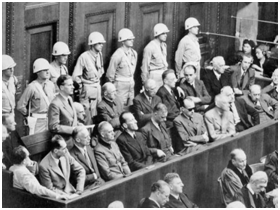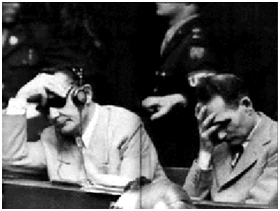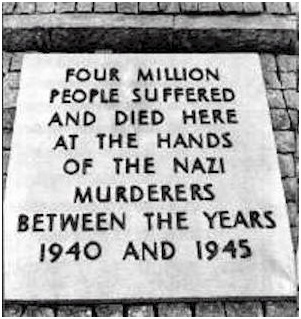1945-1949 CE 1945-1949 CE

Although the legitimacy of the Tribunal was compromised from the outset in the absence of similar precedents in the history of universal prosecution, the work done for the definition of the crimes (also until then unusual in its magnitude) and procedures for development They serve the cause forward for the establishment of international justice.
Thus, concepts of crimes previously absent or vaguely defined as a crime against humanity, evoked in The Hague Convention of 1907. materialize. He also was modified the traditional approach to the rules of international law that focused on the relations between states, but not in the rights and duties of individuals. Since then, the crimes committed by individuals of a nation across several countries could be judged internationally by all affected countries, as it was in the formation of the Nuremberg Tribunal.
In the Nuremberg trials, the Allied powers prosecuted Nazi leaders for war crimes and crimes against humanity. It is the first criminal trial in history to try crimes committed by people in wartime.
November 20, 1945
Start the fundamental process against the main culprits and captured a number of key organizations accused of crimes against peace, war crimes and crimes against humanity led by the International Military Tribunal whose livelihood was the London Charter against 24 main surviving leaders of the Nazi government.

February 13, 1946
The United Nations General Assembly through Resolution (3) recognized as of the following offenses: crimes against peace, war crimes and crimes against humanity as contained in the Charter of the International Military Tribunal at Nuremberg.
December 11, 1946
With the adoption of Resolution (95) confirming the principles of international law recognized in the Charter of the Nuremberg Court and judgments of the Court.
(ECOSOC) United Nations Economic and Social Council, to investigate cultural and social issues, established the Commission on Human Rights and initial aim of the commission was the elaboration of an international declaration, defining human rights.
Following the Nuremberg trials, an international conference in Paris to establish an international criminal code. In this meeting, the International Criminal Court is born.
November 21, 1947
By Resolution (177) was adopted created an Ad Hoc Committee to formulate the principles of international law.
Resolutions (3), (95) and (177) were used for the constitution of the ad hoc tribunals for the prosecution of crimes committed in the former Yugoslavia and Rwanda later to the creation of the Permanent International Criminal Court.

In the year 1948
ILO adopts Convention on Freedom of Association and Protection of the Right to Organize.
The Organization of American States adopted the Declaration of the Rights of Man.
UN adopts the Genocide Convention on 9 December.
The next day, December 10 The UN General Assembly adopted the Universal Declaration of Human Rights (the international articulation of primary and inalienable fundamental rights of all human beings and the first global agreement among nations about the specific rights and freedom of all human beings), the first step in the future development of the Charter of Human Rights for the elaboration of which elapse another 18 years.



